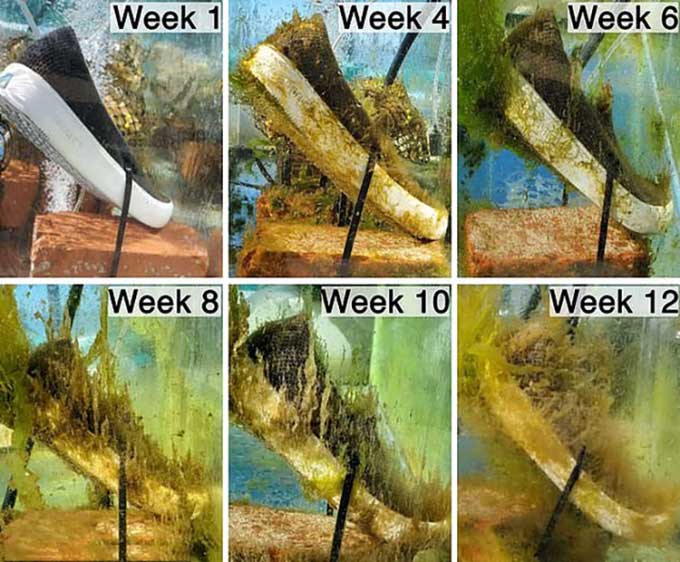Shoes Made from Polyurethane Material Begin to Decompose After Just 4 Weeks in Water, Addressing Ocean Pollution Issues Worldwide.
A team of scientists at the University of California, San Diego, has developed a type of shoe that can biodegrade in seawater, providing nourishment for microorganisms, Newsweek reported on September 23. They stated that this alternative solution could help tackle pollution in the oceans.

Experts at the University of California, San Diego, have created a shoe sample that starts to biodegrade after just 4 weeks in water. (Photo: Daniel Zhen/Algenesis Al).
Shoes represent a significant portion of plastic waste found in marine environments and landfills. Flip-flops made from plastic are the most common type of footwear globally. Currently, plastic waste contaminating the oceans does not decompose but breaks down into smaller particles until it becomes microplastic, persisting for centuries.
However, experts at the University of California, San Diego, have developed a new material that can quickly decompose underwater. To test the new product, the research team collaborated with Samantha Clements, a marine biologist and diver at the Scripps Institution of Oceanography. They used polyurethane material they had previously developed for biodegradation in soil to create the new shoe sample.
The research team found that marine organisms living on the polyurethane foam decompose this material back into its original chemical components. These components are then consumed by microorganisms as nutrients.
“I was amazed to see how many organisms live on the foam underwater. It becomes something like a microbial coral reef. Plastic shouldn’t be in the ocean, but if it is, the new material will become food for microorganisms rather than harmful plastic and microplastics that threaten marine life,” said Stephen Mayfield, a biologist at the University of California, San Diego. Mayfield is also the CEO of the biodegradable shoe company Blueview.
The research team, comprising experts in biology, polymer science, synthetic chemistry, and marine science, monitored shoe samples and discovered that the material begins to decompose after just 4 weeks in the ocean. They also identified microorganisms from six locations in San Diego capable of degrading and consuming the material.
In 2010, scientists estimated that approximately 7.7 million tons of plastic are discharged into the oceans annually, predicting that this number will rise sharply by 2025. Once in the sea, plastic waste harms ecosystems. It also aggregates to form massive garbage patches, such as the Great Pacific Garbage Patch, which spans over 1.5 million square kilometers.


















































